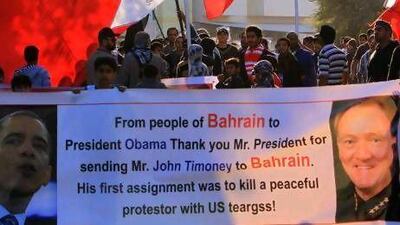MIAMI // Two months into the job of reforming Bahrain's police, American "top cop" John Timoney was being tested yesterday as Bahrainis marked the anniversary of popular demonstrations against the regime with marches in the streets.
Security forces used tear gas and stun grenades against protesters in Manama on the eve of today's anniversary.
Mr Timoney's record in dealing with such civil unrest is mixed.
Some call him a straight talker committed to civil liberties. His detractors rank him as the worst cop in America and the last man to lead any policing reforms.
A former police chief in Miami and Philadelphia and now a consultant on police and security matters, Mr Timoney was hired in December as part of an undertaking by Bahrain's royal family to institute reforms after separate independent and government inquiries found security forces guilty of some abuses.
Since protests broke out in Manama one year ago today, there has been pressure on Bahrain's rulers to improve governance and rein in security forces who have been accused by a commission of inquiry of "grave violations" of human rights.
Activists say more than 60 civilians have been killed by security forces since demonstrations erupted last year.
The Bahrain Independent Commission of Inquiry found of 35 people killed in the two months after the disturbances began, 19 - all civilians - were killed by security forces. Five died after being tortured.
So, Mr Timoney has a tough assignment. But some suggest the man who wrote a book about his police experiences over three decades called Beat Cop to Top Cop should not be trusted to usher in any reform.
Activists cite his handling of anti-capitalism demonstrations in Philadelphia and Miami.
In both cities, Mr Timoney countered planned protests with a massive show of force.
During the Republican National Convention in Philadelphia in 2000, police under his direction made more than 400 arrests.
In Miami three years later, police made more than 200 arrests of demonstrators protesting a meeting of the Free Trade Area of the Americas (FTAA).
In both cases, police were deployed in massive numbers and used tear gas, rubber bullets, Tasers and batons. Critics described the actions as "especially brutal".
Indeed, Mr Timoney became a defining figure for activists and demonstrators, said David Rovics, a musician and veteran anti-capitalist activist.
Mr Rovics said police actions at the FTAA protests amounted to "indiscriminate brutality"
"It was really collective punishment," he said.
And even though it came at the start of his seven years in charge in Miami, the handling of the FTAA protests became a defining moment for Mr Timoney's tenure.
A civilian panel in 2006 found police, "on occasion", had used indiscriminate force.
A circuit judge then said he had seen "no less than 20 felonies committed by police officers" and the force's actions were "a disgrace".
John De Leon, president of the American Civil Liberties Union in Greater Miami, described the police action as "disastrous".
"It was the most overarching use of force I have seen in my lifetime here in this community against people who were protesting and civilians who were exercising their rights under the First Amendment of the US constitution."
But Mr Timoney did a lot of good for the city, Mr De Leon added.
He had been employed to clean up a police department that for years had a reputation for corruption and violence.
One of his first acts was to rewrite the department's use-of-force guidelines.
He did so with dramatic consequences. For 20 months after - the longest period in the department's modern history - there were no police shootings.
"That was a shining moment in the history of the City of Miami police department," Mr De Leon said, "and that was also under the leadership of John Timoney, and for that he deserves credit."
It was arguably the "most progressive" use-of-force policy in the country, said Manny Diaz, who was mayor of Miami throughout Mr Timoney's tenure.
"If you look at the entire seven years, the shooting record, particularly compared to where we were in Miami years ago, is just miraculous", Mr Diaz said.
The former mayor rejected "absolutely" there had been any wholesale trampling of civil rights during the police handling of the FTAA protests.
Mr Timoney did not respond to repeated email requests for comment. But in an interview with National Public Radio in January, he said one of his priorities in Bahrain was a "new code of police conduct".
Such a code, suggested Mr Diaz, would follow a philosophy that demanded police, "be respectful of the rights of people at protests and show the greatest amount of restraint possible".
Mr Rovics, however, said Mr Timoney's record on crowd control demonstrates America's "top cop" was "not to be trusted".
"I think he was hired to put a more human face on repression," he said.

